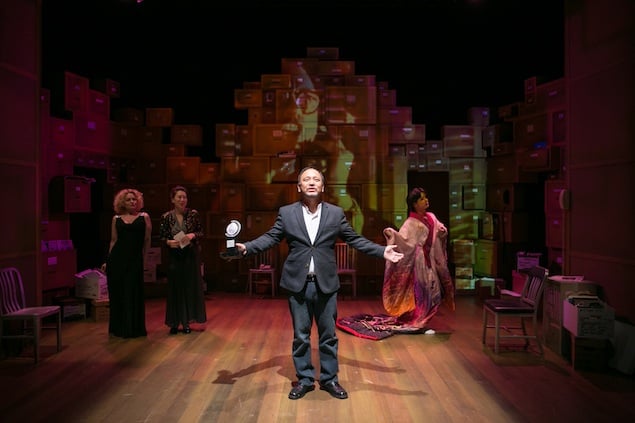
In his play Yellow Face, David Henry Hwang tinkers with the topic of race as if it were a Rubik’s Cube. The show premiered off-Broadway in 2007, but Hwang’s script still sounds like a rough draft, and Theater J’s somewhat under-rehearsed production adds to that feeling.
Yet despite its ramshackle qualities, the play proves consistently engaging. As an audience member, you want Yellow Face to work better and exhibit more edge than a butter knife, but you go along with it anyway. Hwang wrote the 1988 Broadway hit M. Butterfly, scripted the hit musical Aida in 2000, and revised the book for a 2002 revival of the old musical Flower Drum Song. He has a gift for leavening heavy ideas and racial fault lines with humor.
Since the central character in Yellow Face is Hwang (pronounced Wong) himself, that wit is often self-deprecating or self-critical. Listed in the program as DHH (and played by Stan Kang), the playwright guides the audience, often with direct address, through a tumultuous period in his professional life. Newly famous after the success of M. Butterfly, Hwang protested the casting of the white British actor Jonathan Pryce as an Asian character called the Engineer in the musical Miss Saigon before it came to Broadway in 1991. Pryce had played the role to acclaim in London, in full “Asian” makeup. Hwang and other American theater artists of Asian backgrounds got the union Actors Equity to refuse a permit for Pryce to play the role in New York. Then, as Hwang recounts in Yellow Face, their activism backfired. The producers canceled the opening of Miss Saigon, Equity backed down, and Hwang ended up looking bad.
The playwright tried to deal with some of the issues from that kerfuffle in a 1993 play, Face Value, which closed after eight previews on Broadway.
It’s at this juncture that Hwang’s DHH stage persona in Yellow Face becomes an unreliable narrator, following himself on a slippery slope of deception. When his soon-to-flop play is about to begin rehearsals, he and the artistic team hire an actor, Marcus G. Dahlman (Rafael Untalan), to play the lead. Marcus is vague about his background, and after DHH hires him he realizes Marcus isn’t remotely Asian. But there’s a catch-22. He can’t fire Marcus because he’s not Asian—that would be discrimination. So DHH and Marcus enter into an unspoken agreement to imply that Marcus is of a diverse background, some of which includes Jewish ancestors from Siberia, which, after all, is in Asia.
Through all of this weaves the sunny, left-coast presence of the playwright’s father, Henry Y. Hwang, referred to as HYH (Al Twanmo) in the play. It’s a loving portrait of the aging banker—blunt-spoken, quirky, and in love with America and capitalism. (The actor deserves some sort of trouper award: He broke his ankle after the show opened, and is now performing in a wheelchair and cast.) Mr. Hwang and his small California bank become targets of suspicion linking them to mainland China in the late 1990s, and his son uses that and other torn-from-the-headlines stories to further peel the onion of anti-Asian sentiment in America.
Playwright Hwang’s DHH avatar makes one poor decision after another and gets himself into a politically incorrect pickle. How can he, who protested the casting of Jonathan Pryce in Miss Saigon, engage in racially insensitive casting himself? Meanwhile, the actor Marcus starts cashing in on the confusion about his background, which allows for pointed but very gentle spoofs of The King and I.
All this unfolds in playwright Hwang’s memory and in his office, exploded into a handsome, stage-framing array of file cabinets, desks, and chairs (design by Luciana Stecconi). The back wall of stacked file drawers provides a screen for projected photos (by Jared Mezzocchi) that dissolve among the many faces of people discussed in the play.
But like all those photos dissolving into one another, Hwang’s script is constantly shifting in plot and tone. So, too, is the staging by director Natsu Onoda Power. Her actors, who double as ex-girlfriends, activists, theater folk, reporters, and more, seem hesitant about blocking and sometimes about lines. They nearly get hung up on awkward props, such as telephone cords. It’s as if, not quite sure what the playwright is trying to say, the production itself can’t focus.
Yellow Face is at Theater J through February 23. Running time is about two hours and 15 minutes, including one intermission. Tickets ($25 to $65) are available at Theater J’s website.

















